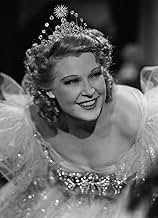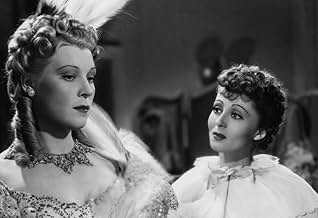Miliza Korjus(1909-1980)
- Actress
- Soundtrack
Miliza's father was Arthur Korjus, a lieutenant colonel in the Imperial
Russian Army and later Chief of Staff to the War Minister of Estonia.
The Estonian branch of her family was of Swedish descent, having
settled in Estonia during the middle of the seventeenth century when
the country was ruled by Sweden. The original Swedish spelling of the
family name was "Corjus" but later came to be spelled "Korjus" in
Estonian. Miliza's mother was Anna Gintowt, who was descended from
Lithuanian-Polish nobility. Miliza was the fifth of six children (she
had one brother, and four sisters). Her mother and father separated
during World War I and in 1918 she moved to Kiev with her mother and
sisters. Miliza received her musical education at the Kiev
Conservatory.
While still in her teens, she joined the Dumka Chorus in Kiev and toured the Soviet Union. During a visit to Leningrad in 1927, she crossed the border into Estonia and joined her father and brother who had settled there after Estonia won its independence from Russia. Under her father's guidance (he played the violin and greatly admired opera), she began making concert appearances in the Baltic states. In 1929 she married Dr. Kuno Foelsch, a physicist, and moved to Germany. She continued her concert career there and was eventually engaged by the Berlin State Opera in 1933. Her operatic appearances and recordings quickly propelled her to the forefront of European singers. Her records were heard by Irving Thalberg of MGM who signed her "sight unseen" to a 10 year film contract. She arrived in Hollywood in March of 1936. Thalberg's death in September of that year delayed production of her first film, and it was not until May of 1938 that she started work on Toute la ville danse (1938). The film was well received and she was nominated for an Academy Award, one of the few singers of the period to be so honored. As a vehicle for her second picture, MGM bought the screen rights to the novel "Sandor Rozsa", a story based on the outlaw of the early 19th century who ambushed the wealthy as they traveled between Budapest and Vienna (a kind of Hungarian Robin Hood). The working title of the picture was "Guns and Fiddles" with music derived from Liszt and arranged by Emmerich Kalman. Her co-stars were to be Robert Taylor (as Sandor Rozsa), Hedy Lamarr and Franchot Tone. On May 28, 1940, just two weeks before the scheduled production date of this new picture, she was seriously injured in an auto accident. Her left leg was so badly crushed that the doctors at first considered amputation. However, after several months in hospital, where she underwent numerous operations and bone grafts, she did recover use of the leg.
By the summer of 1941 she had sufficiently recovered to undertake a concert tour of South America. The tour began in Mexico and shortly afterward the U.S. entered World War II. Having spent her youth in war and revolution, she decided to remain in Mexico for the duration. She made one film there, Caballería del imperio (1942) ("Imperial Chivalry"). She returned to the U.S. in October of 1944 to appear at Carnegie Hall. Eventually, she settled in Los Angeles and made concert appearances throughout North America. In 1952, she married Dr. Walter Shector, a physician, and retired from the stage, preferring instead to make recordings. She remained a bright fixture in southern California society and was greatly admired and sought out by visiting artists such as Joan Sutherland and Beverly Sills. She died of heart failure in August, 1980.
While still in her teens, she joined the Dumka Chorus in Kiev and toured the Soviet Union. During a visit to Leningrad in 1927, she crossed the border into Estonia and joined her father and brother who had settled there after Estonia won its independence from Russia. Under her father's guidance (he played the violin and greatly admired opera), she began making concert appearances in the Baltic states. In 1929 she married Dr. Kuno Foelsch, a physicist, and moved to Germany. She continued her concert career there and was eventually engaged by the Berlin State Opera in 1933. Her operatic appearances and recordings quickly propelled her to the forefront of European singers. Her records were heard by Irving Thalberg of MGM who signed her "sight unseen" to a 10 year film contract. She arrived in Hollywood in March of 1936. Thalberg's death in September of that year delayed production of her first film, and it was not until May of 1938 that she started work on Toute la ville danse (1938). The film was well received and she was nominated for an Academy Award, one of the few singers of the period to be so honored. As a vehicle for her second picture, MGM bought the screen rights to the novel "Sandor Rozsa", a story based on the outlaw of the early 19th century who ambushed the wealthy as they traveled between Budapest and Vienna (a kind of Hungarian Robin Hood). The working title of the picture was "Guns and Fiddles" with music derived from Liszt and arranged by Emmerich Kalman. Her co-stars were to be Robert Taylor (as Sandor Rozsa), Hedy Lamarr and Franchot Tone. On May 28, 1940, just two weeks before the scheduled production date of this new picture, she was seriously injured in an auto accident. Her left leg was so badly crushed that the doctors at first considered amputation. However, after several months in hospital, where she underwent numerous operations and bone grafts, she did recover use of the leg.
By the summer of 1941 she had sufficiently recovered to undertake a concert tour of South America. The tour began in Mexico and shortly afterward the U.S. entered World War II. Having spent her youth in war and revolution, she decided to remain in Mexico for the duration. She made one film there, Caballería del imperio (1942) ("Imperial Chivalry"). She returned to the U.S. in October of 1944 to appear at Carnegie Hall. Eventually, she settled in Los Angeles and made concert appearances throughout North America. In 1952, she married Dr. Walter Shector, a physician, and retired from the stage, preferring instead to make recordings. She remained a bright fixture in southern California society and was greatly admired and sought out by visiting artists such as Joan Sutherland and Beverly Sills. She died of heart failure in August, 1980.

















